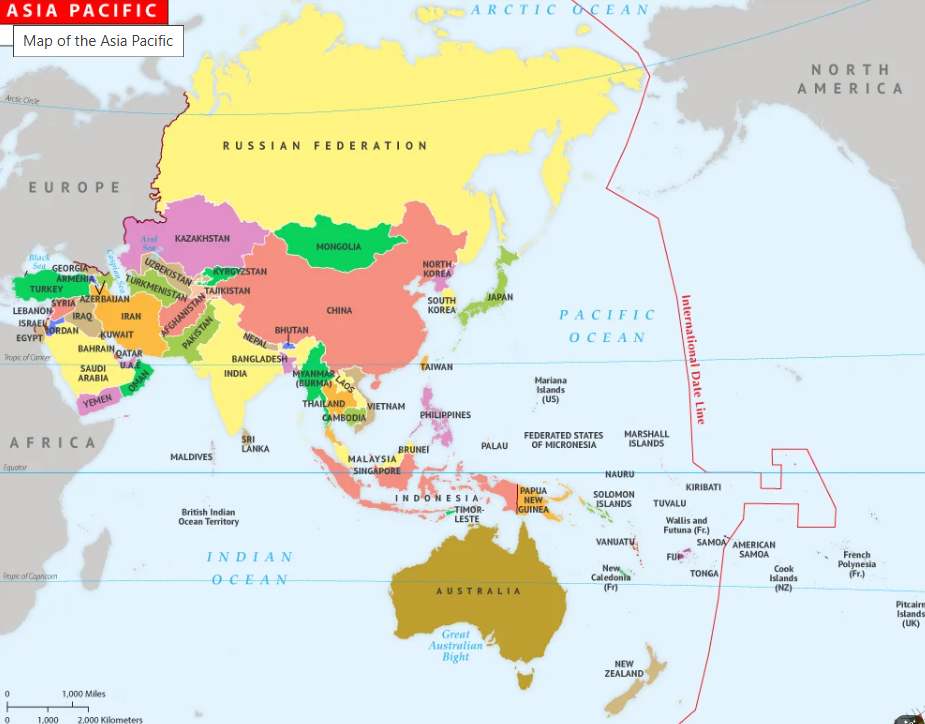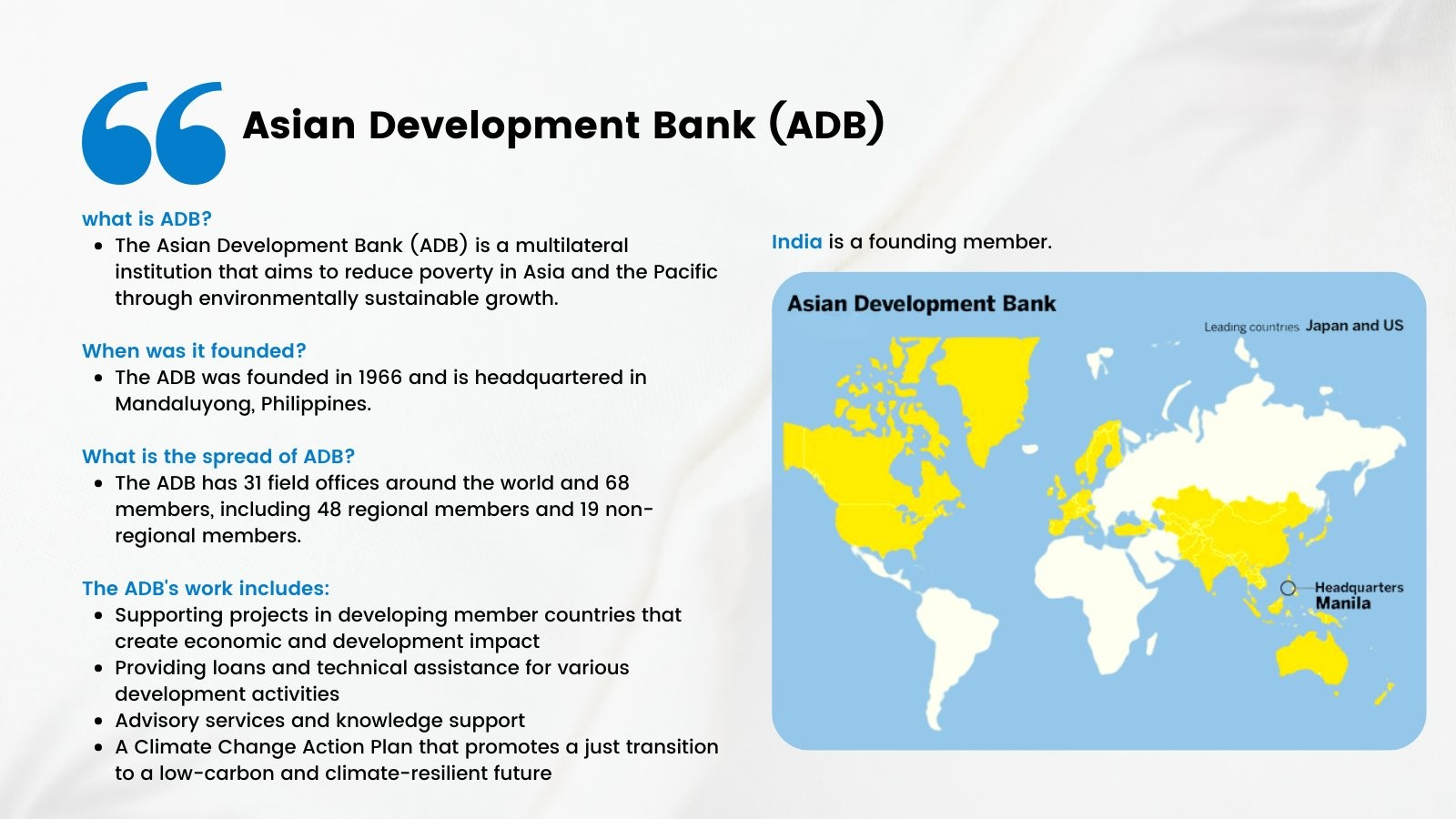Important Facts For Prelims
Asia-Pacific Climate Report 2024
- 05 Nov 2024
- 6 min read
Why in News?
Recently, the Asian Development Bank (ADB) released its Asia–Pacific (APAC) Climate Report 2024, highlighting alarming economic impacts of climate change on the Asia-Pacific region.
What are the Key Highlights of the Asia-Pacific Climate Report 2024?
- Economic Impacts of Climate Change:
- Under high-end greenhouse gas emissions, the APAC region could see a 17% reduction in Gross Domestic Product (GDP) by 2070.
- By 2100, this figure may surge to 41% under high GHG emissions.
- India may experience a 24.7% GDP decline by 2070. Bangladesh faces a potential 30.5% loss, while Vietnam could see a 30.2% reduction, and Indonesia a 26.8% decline.
- Under high-end greenhouse gas emissions, the APAC region could see a 17% reduction in Gross Domestic Product (GDP) by 2070.
- Main Drivers of Economic Losses:
- Sea Level Rise: Up to 300 million people are at risk of coastal flooding due to sea level rise by 2070. Annual damages could climb to USD 3 trillion by 2070.
- Labour Productivity Decline: The APAC region is expected to suffer a 4.9% GDP loss due to reduced labour productivity, but India’s loss could be as high as 11.6%.
- Cooling Demands: Rising temperatures could reduce regional GDP by 3.3%, while India's GDP may face a sharper decline of 5.1% due to cooling requirements.
- Climate Change Impact on Natural Disasters:
- Riverine Flooding: By 2070, annual river flooding could lead to USD 1.3 trillion in damages across the APAC region, impacting over 110 million people.
- India’s projected losses include residential damages exceeding USD 400 billion and commercial damages surpassing USD 700 billion.
- Storms and Rainfall: Increased intensity of tropical storms and rainfall is expected to worsen floods and landslides, especially in mountainous areas like the India-China border, where landslides may increase by 30-70% under severe warming.
- Riverine Flooding: By 2070, annual river flooding could lead to USD 1.3 trillion in damages across the APAC region, impacting over 110 million people.
- Implications for Forests and Ecosystems: Climate change is projected to reduce forest productivity in the APAC region by 10-30% by 2070 under high-emission scenarios.
- India faces losses over 25%, alongside Vietnam and Southeast Asia, while regions like China and Central Asia may see losses under 5%.
- Steps Needed for Improvement:
- Net-Zero Targets and Gaps: 36 out of 44 economies in Asia have set net-zero emission targets. However, only four countries have legally enshrined these targets, and most lack detailed plans.
- India and China aim for 2070 and 2060 targets, lagging behind many Organisation for Economic Co-operation and Development (OECD) economies, of which 32 out of 38 have net-zero targets and 23 are legally committed and many aiming for 2050.
- To enhance its climate ambitions, developing Asia requires clearer policies and increased financing support, with institutions like ADB poised to assist in achieving these goals.
- Climate Finance: The region needs USD 102–431 billion annually for climate adaptation, a significant leap from the USD 34 billion tracked from 2021 to 2022.
- Greater private investment and enhanced policies are necessary to meet these targets. Enhanced recognition of climate risks and regulatory reforms can help attract private climate investment.
- The report emphasises the need to accelerate adaptation responses and scale up adaptation-focused climate finance.
- Renewable Energy: The report underscores the region’s potential to leverage renewable energy for a net-zero transition.
- Embracing domestic and international carbon markets is highlighted as a cost-effective means for climate action.
- Net-Zero Targets and Gaps: 36 out of 44 economies in Asia have set net-zero emission targets. However, only four countries have legally enshrined these targets, and most lack detailed plans.
Asian Development Bank (ADB)
- ADB is a regional development bank founded in 1966 to promote economic growth and reduce poverty in Asia by providing loans, technical assistance, and grants for projects in infrastructure, education, health care, and climate change.
- ADB has 69 shareholding members including 49 from the Asia and Pacific region. India, a founding member of ADB, is now ADB's fourth largest shareholder and its top borrower since 2010.
- It is committed to achieving a prosperous, inclusive, resilient, and sustainable Asia and the Pacific while sustaining its efforts to eradicate extreme poverty.
- Headquarters: Manila, Philippines.
UPSC Civil Services Examination, Previous Year Questions (PYQs)
Q. The Global Infrastructure Facility is a/an (2017)
(a) ASEAN initiative to upgrade infrastructure in Asia and financed by credit from the Asian Development Bank.
(b) World Bank collaboration that facilitates the preparation and structuring of complex infrastructure Public-Private Partnerships (PPPs) to enable mobilization of private sector and institutional investor capital.
(c) Collaboration among the major banks of the world working with the OECD and focused on expanding the set of infrastructure projects that have the potential to mobilize private investment.
(d) UNCTAD funded initiative that seeks to finance and facilitate infrastructure development in the world.
Ans: (b)






